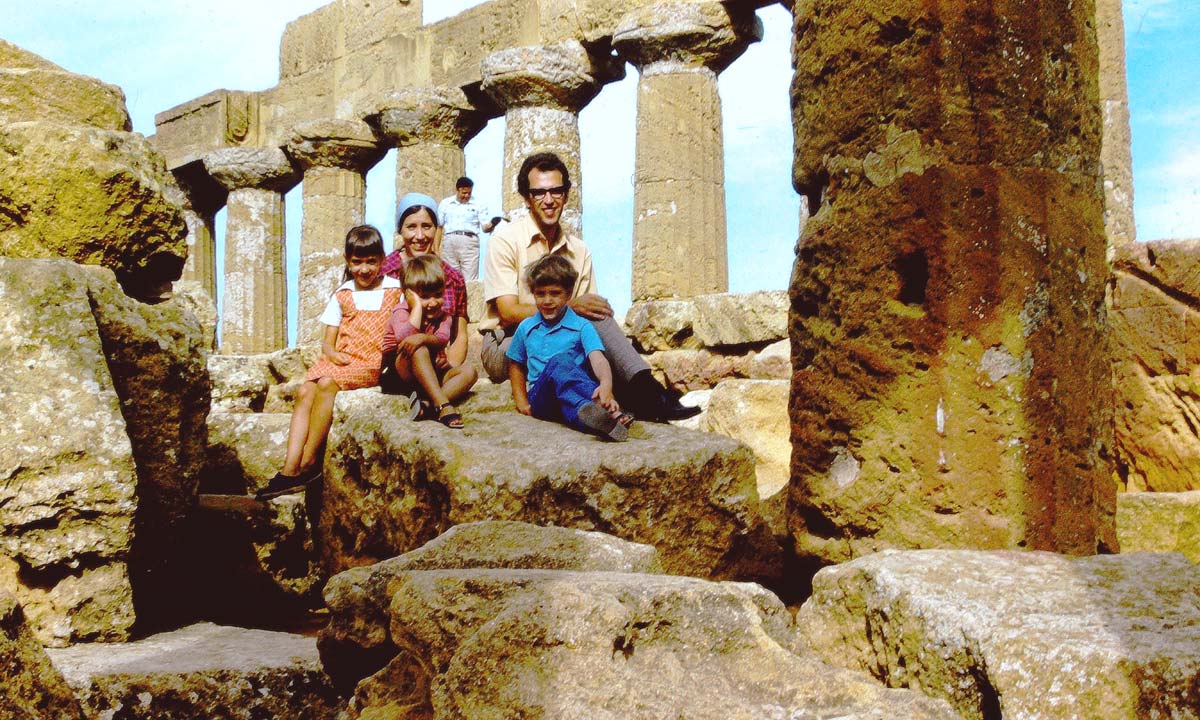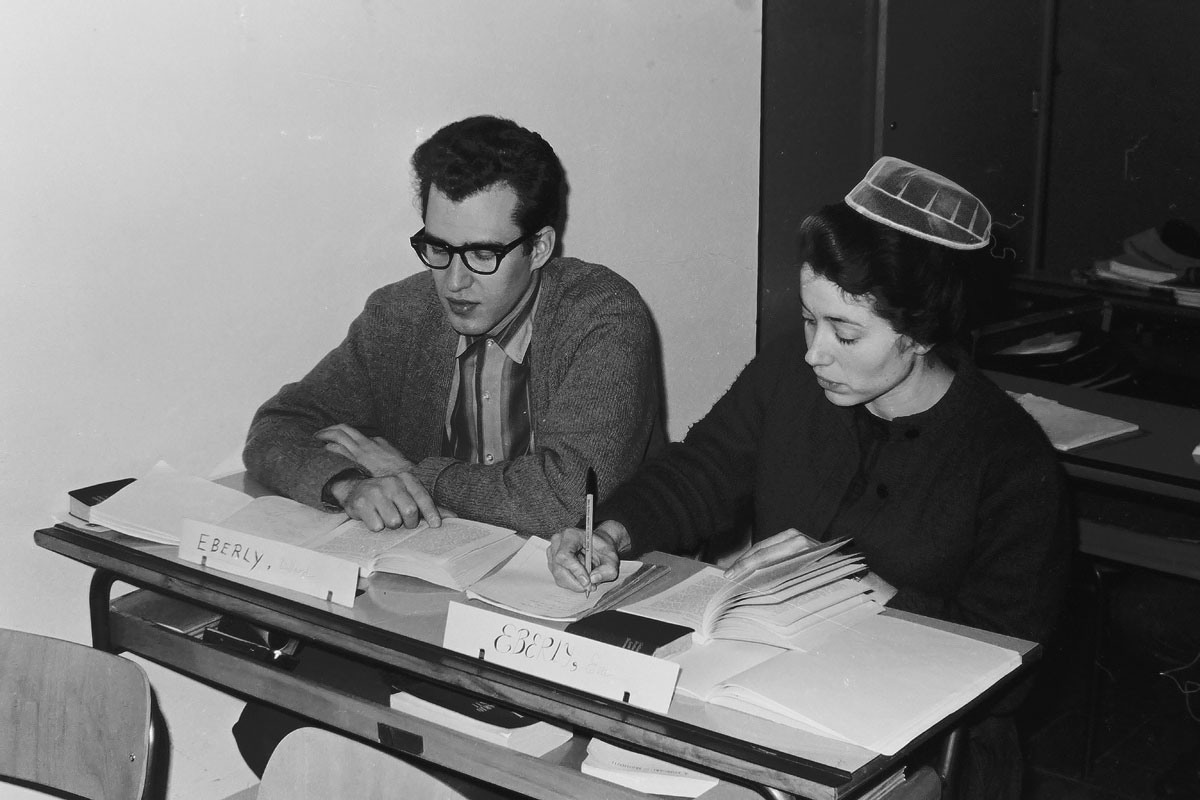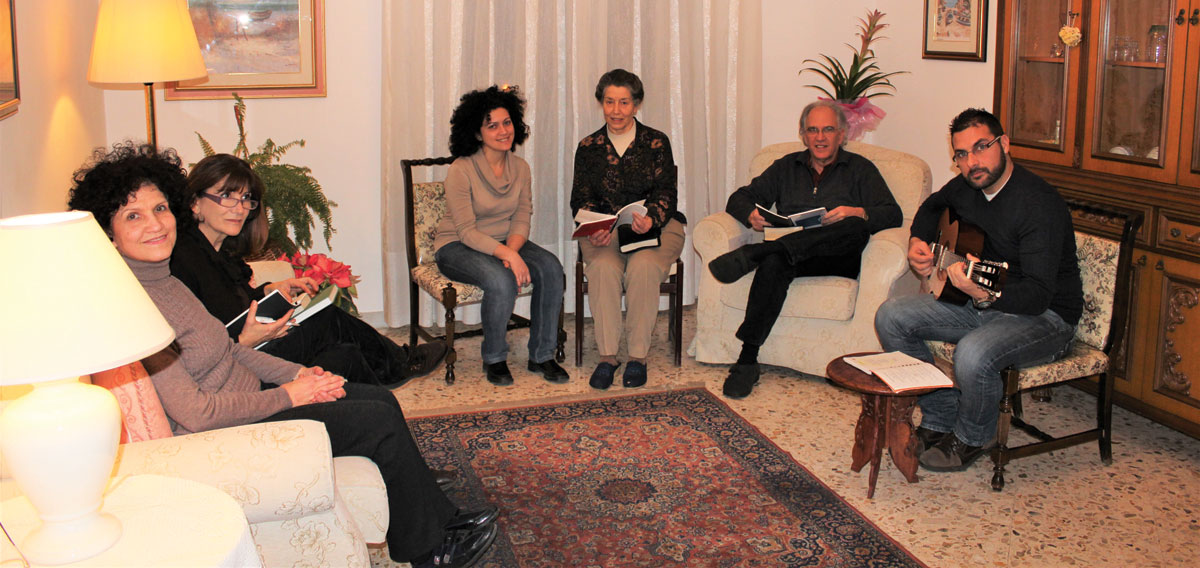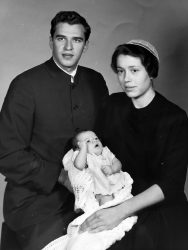Eight Lessons from a Lifetime in Mission

Willard and Eva Eberly and their children Maurita, Andy, and Mike, enjoy a family outing in 1976 to explore an ancient temple near Menfi, Sicily, built by the Greeks (approx. 500 BC).
Fifty-two years after Willard and Eva Eberly were called to serve in Italy, they look back on key lessons they learned.
By Willard and Eva Eberly
All photos courtesy of Willard and Eva Eberly
Several years later, after our three children were established as young adults in the US, Willard accepted a position with VMMissions as Mediterranean Regional Director, with Eva serving as his assistant. From a home base most of that time in Bari, Italy, we served in this way for 20 years (1991-2011), expanding the work to include Albania, Kosovo, and Montenegro.
What we’ve learned about engaging cross-culturally could fill a book! Here are a few of those lessons:
Invest in learning language
What could be more important than seriously concentrating on language study and learning to speak well! Good communication is essential in establishing meaningful, trusting relationships and for effective Bible teaching and ministry into people’s lives. All of this is made easier if we are willing to purposely detach from “back home,” limiting social media connections and relinquishing emotional ties to the sending culture.

Willard and Eva study the Italian language upon arrival.
Be flexible
Frequently new workers begin with their own preconceived ideas, personal expectations, hopes, and visions for what they want to accomplish. What happens when these never materialize due to changing circumstances and factors? Responding with frustration and discouragement can threaten to derail commitment. This is precisely the moment to wait and listen to God’s plans and follow him by faith. Engaging in cross-cultural missions means learning to walk by faith, not by sight—because, humanly speaking, it is an impossible, daunting task!
Extend hospitality
Early in our missionary experience when our children were small, God nudged us to consecrate our home for hospitality and ministry. Almost as soon as we did so, God began bringing people to our door. The doorbell rang so frequently that sometimes we felt overwhelmed! Although requiring much sacrifice, making our lives and home available for the Spirit’s use yielded rich rewards.
We found the home setting conducive to deep sharing, listening, and praying with new believers, many of whom came to Christ from broken backgrounds. Without this support, they easily return to old defeating life-patterns.
Although mass media has its place in communicating the gospel, we soon learned that the majority come to faith in Jesus Christ through the consistent example and loving witness of Christian friends and family. We observe that mission workers who guard their homes as their own private space tend to experience a less fruitful ministry.
Focus on equipping others
Our basic mission philosophy and methodology was modeling, discipling and equipping believers in every aspect of Christian living. As soon as possible, we attempted to involve others in everything we did—as observers, active participants, and later delegating responsibility to them.
Don’t expect immediate results
A difficult lesson to learn was that “sowing the seed” is an act of faith. Although not always reaping where we’ve sown, we may reap where others have sown! We might be only a link in the chain of witnesses that brings someone to faith! Understanding this biblical principle prevents discouragement in the absence of immediate results.
This story can serve to illustrate: a casual contact in Sicily to whom we’d witnessed called us twenty years later. In amazement, we listened to her story. She told us how she had cried out to God in a moment of deep despondency. “Lord, I want to know you like Willard and Eva do.” Soon after praying that prayer, she “happened” to meet evangelical Christians there in Northern Italy where she was then living. They led her to experience new life in Christ! Now her husband and daughter are also believers! We must persevere faithfully with long-term vision, firmly believing that “we will reap if we faint not” (Gal 6:9).

Throughout their years in Italy, home Bible studies such as this one were a central feature of Willard and Eva’s ministry.
Understand the reality of spiritual warfare
Doubtlessly, spiritual warfare was the most life-changing reality confronting us on the “frontlines.” God opened our eyes to its reality when we became aware of the presence of a powerful sorcerer in the church Willard was pastoring. He posed as a believer with “many spiritual gifts” — divination, healing, discerning spirits, etc. — but there was no evidence of the fruit of the Spirit in his life. We spent months in prayer and discernment, consulting with other leaders. We devoured helpful books.
God miraculously revealed who this man was and what action was needed to free the church from the enemy’s infiltration. This process incited a tremendously hostile reaction. We began receiving anonymous telephone calls threatening our lives if we continued working with the church. Following this spiritual liberation, our little church began radiating an atmosphere of joy. New persons were drawn into relationship with Jesus.
This painful trial alerted us to the battle raging in the spiritual world against God’s kingdom and to the barriers that hinder faith in Jesus. We soon discovered that nearly every Sicilian family we knew had been involved in spiritism, superstitions, or some kind of occult practice. Spiritual oppression and bondage manifested in various ways and victory came only through intercessory prayer, dependence on God’s word and on his Spirit.
Understanding the dynamics of authentic freedom in Christ transformed our personal lives, as well as our perspectives on evangelism, discipleship, and soul care. The good news took on fresh meaning as we witnessed the kingdom of God breaking through spiritual barriers. We believe this is a key to the formation of disciples that flourish and to establishing churches that thrive.
Realize you will have regrets
We would have certainly done some things differently, if we would have known then what we learned through experience, like giving prayer higher priority. We regret having neglected teaching the principles of tithing and generous giving, so that the church could move forward and multiply. Our sensitivity to their poverty due to economic oppression of the mafia and high unemployment made us reticent to teach financial stewardship.
Stay available when the “assignment” is over
Upon re-entry to Virginia six years ago, we were surprised to discover the large population of immigrants living in this area. How astonishing that the nations have come to us. Our passion for missions was immediately re-ignited. When we make ourselves available, God uses us!
Willard’s diversion of meeting people as an Uber driver has opened doors for friendship and sharing the gospel with some of these international people. We’ve been able to connect in significant ways to people from Afghanistan, China, Lebanon, and Iran. God recently surprised us by bringing several of our Kurdish friends to faith in Jesus! Eva serves on the Ministry Support Team of a missionary in Cambodia and is missions coordinator at our church. Instead of retiring, we continue to apply what God taught us in cross-cultural missions right here in the Shenandoah Valley.
Willard and Eva served as longtime mission workers in Italy and later as staff members of VMMissions. They reside in Broadway, Va., and continue to engage in mission with global neighbors.

